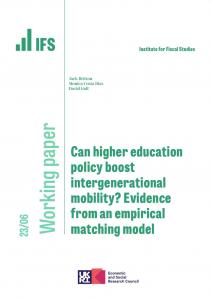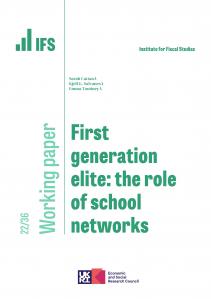Women with a masters degree earn considerably more at age 35 than those with only an undergraduate degree, with average earnings of £35,400, compared with £32,500 for those who do not go beyond undergraduate level. For men, the differences are even larger: masters graduates earn £55,800 on average, £5,000 more than those with only an undergraduate degree. Most of these earnings differences can be accounted for by masters graduates coming from better-off backgrounds, and having higher prior attainment, than those who do not pursue postgraduate qualifications. Compared with otherwise-similar individuals who don’t go beyond undergraduate level, by age 35 women with a masters degree earn 2% more and men 2% less.
PhD graduates also earn more at age 35 than those with an undergraduate degree only, with average earnings of £36,000 for women and £51,900 for men. When we compare individuals with the same prior attainment and background, women withPhDs still earn 8% more at age 35 than otherwise-similar women without a postgraduate qualification, but men with PhDs earn 9% less than their less-well-qualified peers. Having a PhD, though, provides some certainty of at least reasonable earnings. Very few end up unemployed or on low earnings.
Postgraduate Certificate of Education (PGCE) graduates have average earnings of £38,100 for men and £28,800 for women, less than for those with an undergraduate degree only. Once we account for the differences in prior attainment – in particular, PGCE graduates having taken lower-earning undergraduate subjects on average – we find that PGCEs reduce the earnings of graduate men at age 35 by 2% and increase those of women by 1%. Like PhDs, they do protect against bad labour market outcomes.
These averages mask important variation by subject and by prior undergraduate degree. Masters in business, economics and law have returns upwards of 10% for both men and women. On the other hand, a few arts and humanities masters courses are associated with men earning more than 20% less than similar individuals without a postgraduate degree. Having done an arts degree, ‘doubling down’ by going on to a further degree in the same field seems to result in large negative returns. For those with relatively low-returning undergraduate qualifications (e.g. in arts or humanities), PGCEs and masters in business, law or economics offer very good returns, assuming they can be accessed.
For students with an undergraduate degree in economics, law and many science subjects, PGCEs reduce earnings by more than 10%. English, sports science and creative arts graduates see large positive returns to taking a PGCE. These patterns may explain teacher recruitment challenges in subjects such as maths, physics and chemistry.
There are large differences in access to postgraduate degrees by parental background. Virtually all of this participation gap can be explained by prior attainment in school and during undergraduate degrees.
These are among the findings of new work from the Institute for Fiscal Studies (IFS) using the LEO data, which link university and tax records for everyone who attended university since 1995. We estimate the earnings returns to doing a postgraduate degree relative to leaving education after doing an undergraduate degree. By controlling for differences between students, we effectively compare individuals who took postgraduate degrees with individuals with similar prior attainment and background who obtained an undergraduate qualification but who did not pursue a postgraduate qualification. We separately estimate returns for masters, PGCEs and PhDs, and investigate how these vary by subject and institution as well as the prior undergraduate subject of the individual. The results focus on earnings at age 35, for individuals who completed their postgraduate degree by the age of 30.
This study only looks at earnings returns to postgraduate degrees at a specific age, which is relatively early in a graduate’s career. For PhDs in particular, there appears to be some evidence that the returns could continue to rise with age beyond the point we are investigating here. We are not able to capture returns to society or wider benefits to the individual – such as access to certain occupations – which are likely to be an important part of the overall returns to these degrees. We also do not factor in the cost of the postgraduate courses or estimate returns throughout people’s working lives.
Laura van der Erve, co-author of the report and a Research Economist at IFS, said:
‘On average, masters graduates do not see substantially higher earnings than otherwise-similar individuals who don’t go beyond undergraduate level. However, this obscures huge differences across subjects, with some subjects such as law and business boosting earnings by more than 15% at age 35, but graduates of courses such as creative arts, English and philosophy having earnings more than 10% lower than similar individuals who did not pursue a postgraduate qualification. Graduates of nearly all undergraduate subjects are able to access postgraduate courses that substantially boost their earnings.’
Jack Britton, co-author of the report and an Associate Director at IFS, said:
‘Postgraduate degrees do not seem to increase earnings at age 35 on average, but there are several other possible advantages to postgraduate degrees – they potentially allow students to specialise in an area they are passionate about, and they also appear to have some insurance value by increasing the chances of people entering secure employment. The results also starkly highlight the ongoing challenge in recruiting teachers into high-priority subjects, as returns to PGCE qualifications for maths and science graduates are very low.’












